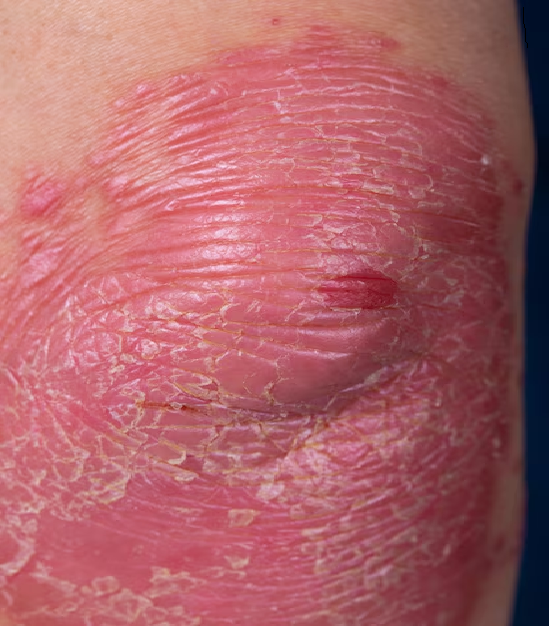Psoriasis
Psoriasis is a chronic autoimmune condition that causes skin cells to multiply up to ten times faster than normal. This leads to a buildup of skin cells on the surface, resulting in red, scaly patches, often covered with white or silvery scales. Psoriasis can appear anywhere on the body but commonly affects the scalp, elbows, knees, and lower back. Here’s a closer look at psoriasis causes and management:
Types of Psoriasis
- Plaque Psoriasis: The most common type, marked by raised, red patches covered with a silvery layer of dead skin.
- Guttate Psoriasis: Small, drop-shaped spots, usually triggered by infections like strep throat, appearing mostly in children and young adults.
- Inverse Psoriasis: Smooth, red patches, often in skin folds (e.g., armpits, groin), worsened by friction and sweating.
- Pustular Psoriasis: Characterized by white pustules surrounded by red skin, typically on the hands or feet.
- Erythrodermic Psoriasis: A rare, severe type causing widespread redness and shedding, often requiring immediate medical attention.
Symptoms of psoriasis
- Red patches of skin with thick, silvery scales
- Dry, cracked skin that may bleed or itch
- Itching, burning, or soreness
- Thickened or ridged nails
- Joint pain or swelling (seen in psoriatic arthritis)
Psoriasis Causes and Management
Causes
Psoriasis is thought to result from an immune system malfunction, where immune cells mistakenly attack healthy skin cells, triggering an overproduction of skin cells. Genetics, environmental factors, and triggers such as stress, injury, infections, smoking, and certain medications can play a role.
Treatments
There’s no cure for psoriasis, but treatments aim to manage symptoms. They include:
- Topical Treatments: Corticosteroids, vitamin D analogs, salicylic acid, and topical retinoids help reduce inflammation and slow skin cell turnover.
- Light Therapy (Phototherapy): Controlled exposure to ultraviolet light can slow skin cell growth.
- Systemic Medications: For moderate to severe psoriasis, oral or injected medications like methotrexate, cyclosporine, or biologics can target the immune response.
- Lifestyle and Home Remedies: Moisturizing, gentle exfoliation, and avoiding triggers (like stress) can help manage symptoms.
While psoriasis can be uncomfortable and may impact self-esteem, treatments and lifestyle modifications can often significantly improve quality of life. To book an appointment Click here.

Thanks for the post, is there any way I can get an email whenever there is a new post?
I like this post, enjoyed this one appreciate it for putting up. “‘I have done my best.’ That is about all the philosophy of living one needs.” by Lin Yutang.